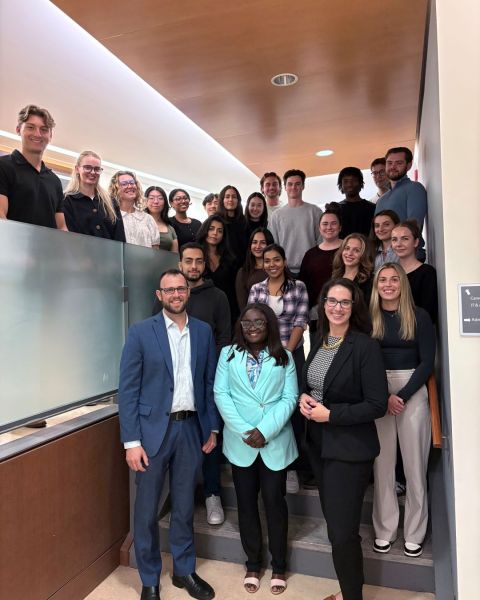
For a business or non-profit to succeed, its goods and services must stand out in the marketplace. That means investing time, effort and money into building a brand — through words, logos, colours, and other identifiers. But to ensure those brand elements remain unique, legal protection is essential. Registering a trademark is a key step, yet many startups can’t afford the legal fees to do it.
That’s where the Queen’s Business Law Clinic (QBLC) steps in.
To better support Kingston-area startups with brand protection, the QBLC launched a new Trademarks Workshop Series in October. The first session was led by trademark experts Jamie-Lynn Kraft of Smart & Biggar and Robert Maratta, Law’15, of Cunningham Swan Lawyers. They guided student caseworkers and other interested law students through hands-on exercises in trademark searches and preparing availability opinions.
“The Trademarks Workshop gave me a much better understanding of how to search for existing trademarks in Canada, and which similarities are most impactful to a new application,” says Nick Rallis, Law’26, a QBLC student caseworker. “This understanding is extremely valuable given how frequently we provide this type of service to businesses at the clinic. Filing trademarks is a very common first step for many of our clients, so being able to effectively provide this service helps them grow.”
QBLC Director Tomi Adebiyi, who also supervises student casework, says the workshop series fills an important gap for both students and small businesses.
“It’s important that startups conduct proper due diligence into their chosen trademark so they don’t end up paying a huge, needless price later when they discover it can’t be registered,” she explains. “But many local startups can’t afford a lawyer or trademark agent’s fees, and they’re unfamiliar with the Trademarks Act and uncomfortable filing the application themselves.”
Having access to trained student caseworkers offers a huge relief to those businesses, she adds. “Students gain a career advantage too, as they’ll be better prepared to handle client work related to trademarks.”
Empowering small businesses through legal support
As a QBLC student caseworker in 2024–25, Dimitri Kolar, Law’26, helped startups and small businesses apply for trademarks to safeguard their brands and ideas. That meant helping clients define and protect the distinctive elements of their brands while navigating the legal and procedural requirements of registration.
“Securing a trademark protects the identity and reputation of a business,” he says. “It helps ensure entrepreneurs’ innovations are recognized as unique in their markets. A registered trademark helps reduce confusion if there are businesses using similar marks and offering similar goods or services.”
By guiding clients through each step of the process, Kolar helped make complex legal procedures accessible to those with limited resources.
“Trademarks work aligns closely with my interest in supporting small businesses through accessible legal services,” he says. “It empowers entrepreneurs to protect their brands, build credibility, and unlock opportunities for growth.”
“The work we do at QBLC,” Kolar adds, “ultimately promotes economic development within our community, and trademarks and intellectual property files play an important role in advancing that goal.”
More workshops are planned this academic year to prepare students to advise clients through the entire trademark application process.
By Lisa Graham